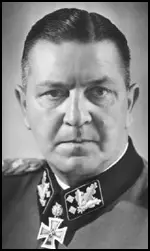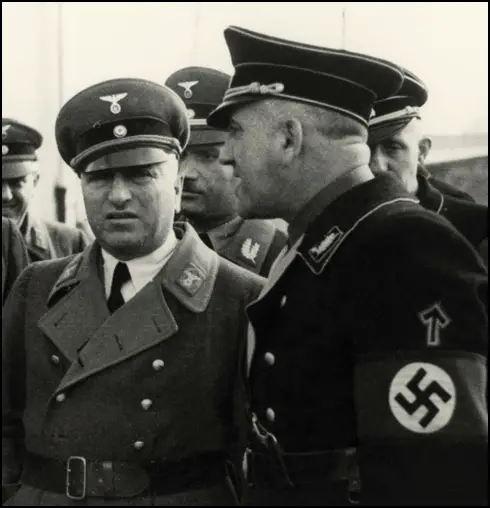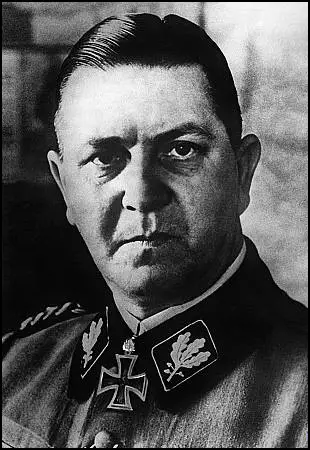Theodore Eicke

Theodore Eicke, the son of a station master, was born in Hampont (close to Château-Salins), Alsace-Lorraine, on 17th October, 1892. Eicke joined the German Army and during the First World War won the Iron Cross for bravery. He was active in the Freikorps before becoming an inspector in the Thuringian police force. He held various police jobs, all of which he lost because of his uncompromising hostility to the Weimar Republic.
Eicke joined the National Socialist German Workers Party (NSDAP) in 1928 and two years later took command of a Schutzstaffel (SS) regiment of the Rhine-Palatinate. Suspected of carrying out bomb attacks on political opponents, Heinrich Himmler advised Eicke to go and live in Italy. In March 1932 he was sentenced to two years' imprisonment for preparing political bomb attacks.
After Adolf Hitler came to power Eicke returned to Germany. Charles W. Sydnor, the author of Soldiers of Destruction (1977) has pointed out: "Ever-suspicious, quarrelsome, cruel, humorless, and afflicted with a cancerous ambition. Eicke was a genuinely fanatic Nazi who had embraced the movement's political and racial liturgy with the zeal of the late convert, advancing rapidly and unshakably into the power structure of the Third Reich. Moreover, Eicke had demonstrated that he possessed in abundance the basic qualities needed to get to the top in the SS-uncompromising ruthlessness in the service of obedience, a marked talent for organization, and a gift for inspiring and leading men."
In 1933 Eicke was appointed as commandant of Dachau. It was the first concentration camp to be built in Nazi Germany. According to Andrew Mollo, the author of To The Death's Head: The Story of the SS (1982): "Theodor Eicke, a rough unstable character whose violent and unruly behaviour had already given Himmler many headaches. At last Himmler found an ideal backwater for his troublesome subordinate and sent him off to Dachau." Eicke later recalled: "There were times when we has no coats, no boots, no socks. Without so much as a murmur, our men wore their own clothes on duty. We were generally regarded as a necessary evil that only cost money; little men of no consequence standing guard behind barbed wire. The pay of my officers and men, meagre though it was, I had to beg from the various State Finance Offices. As Oberführer I earned in Dachau 230 Reichmark per month and was fortunate because I enjoyed the confidence of my Reichsführer (Himmler). At the beginning there was not a single cartridge, not a single rifle, let alone machine guns. Only three of my men knew how to operate a machine gun. They slept in draughty factory halls. Everywhere there was poverty and want. At the time these men belonged to SS District South. They left it to me to take care of my men's troubles but, unasked, sent men they wanted to be rid of in Munich for some reason or another. These misfits polluted my unit and troubled its state of mind. I had to contend with disloyalty, embezzlement and corruption."
With the support of Heinrich Himmler things began to improve: "From now on progress was unimpeded. I set to work unreservedly and joyfully; I trained soldiers as non-commissioned officers, and non-commissioned officers as leaders. United in our readiness for sacrifice and suffering and in cordial comradeship we created in a few weeks an excellent discipline which produced an outstanding esprit de corps. We did not become megalomaniacs, because we were all poor. Behind the barbed-wire fence we quietly did our duty, and without pity cast out from our ranks anyone who showed the least sign of disloyalty. Thus moulded and thus trained, the camp guard unit grew in the quietness of the concentration camp.

Rudolf Hoess, one of the guards at Dachau, later recalled: "I can clearly remember the first flogging that I witnessed. Eicke had issued orders that a minimum of one company from the guard unit must attend the infliction of these corporal punishments. Two prisoners who had stolen cigarettes from the canteen were sentenced to twenty-five lashes each with the whip. The troops under arms were formed up in an open square in the centre of which stood the Whipping block.Two prisoners were led forward by their block leaders. Then the commandant arrived. The commander of the protective custody compound and the senior company commander reported to him. The Rapportfiihrer read out the sentence and the first prisoner, a small impenitent malingerer, was made to lie along; the length of the block. Two soldiers held his head and hands and two block leaders carried out the punishment, delivering alternate strokes. The prisoner uttered no sound. The other prisoner, a professional politician of strong physique, behaved quite differently. He cried out at the very first stroke and tried to break free. He went on screaming to the end, although the commandant yelled at him to keep quiet. I was standing in the first rank and was compelled to watch the whole procedure. I say compelled, because if I had been in the rear I would not have looked. When the man began to scream I went hot and cold all over. In fact the whole thing, even the beating of the first prisoner made me shudder. Later on, at the beginning of the war, I attended my first execution, but it did not affect me nearly so much as witnessing that first corporal punishment."
In May 1934 Eicke was given responsibility of reorganizing Germany's concentration camp system. One of his recommendations was that guards should be warned that they would be punished if they showed prisoners any signs of humanity. Charles W. Sydnor believed that "Eicke's personality, in particular his unremitting hatred for everything and everyone non-Nazi, influenced definitively the development, the structure, and the uniquely inhumane ethos of the concentration camps. Eicke was convinced that the camps were the most effective instrument available for destroying the enemies of National Socialism. He regarded all prisoners as subhuman adversaries of the State, marked for immediate destruction if they offered the slightest resistance. Eicke eventually succeeded in nurturing this same attitude among many SS guards in the camps.... Like many of the concentration camp commanders he trained, Eicke basically was pitiless and cruelly insensitive to human suffering, and regarded qualities such as mercy and charity as useless, outmoded absurdities that could not be tolerated in the SS."
Adolf Hitler was also aware that Ernst Roehm and the Sturmabteilung (SA) had the power to remove him. Hermann Goering and Heinrich Himmler played on this fear by constantly feeding him with new information on Roehm's proposed coup. Their masterstroke was to claim that Gregor Strasser, whom Hitler hated, was part of the planned conspiracy against him. With this news Hitler ordered all the SA leaders to attend a meeting in the Hanselbauer Hotel in Bad Wiesse.
Meanwhile Goering and Himmler were drawing up a list of people outside the SA that they wanted killed. The list included Gregor Strasser, Kurt von Schleicher, Hitler's predecessor as chancellor, and Gustav von Kahr, who crushed the Beer Hall Putsch in 1923. Louis L. Snyder argues: "Hitler later alleged that his trusted friend Roehm had entered a conspiracy to take over political power. The Führer was told, possibly by one of Roehm's jealous colleagues, that Roehm intended to use the SA to bring a socialist state into existence... On June, 1934... Hitler came to his final decision to eliminate the socialist element in the party. A list of hundreds of victims was prepared."
On 29th June, 1934. Hitler and selected members of the Schutzstaffel (SS), arrived at Bad Wiesse, where he personally arrested Ernst Roehm. During the next 24 hours 200 other senior SA officers were arrested on the way to the meeting. Erich Kempka, Hitler's chauffeur, witnessed what happened: "Hitler entered Roehm's bedroom alone with a whip in his hand. Behind him were two detectives with pistols at the ready. He spat out the words; Roehm, you are under arrest. Roehm's doctor comes out of a room and to our surprise he has his wife with him. I hear Lutze putting in a good word for him with Hitler. Then Hitler walks up to him, greets him, shakes hand with his wife and asks them to leave the hotel, it isn't a pleasant place for them to stay in, that day. Now the bus arrives. Quickly, the SA leaders are collected from the laundry room and walk past Roehm under police guard. Roehm looks up from his coffee sadly and waves to them in a melancholy way. At last Roehm too is led from the hotel. He walks past Hitler with his head bowed, completely apathetic."
A large number of the SA officers were shot as soon as they were captured but Hitler decided to pardon Roehm because of his past services to the movement. However, after much pressure from Hermann Goering and Heinrich Himmler, Hitler agreed that Roehm should die. Himmler ordered Theodore Eicke to carry out the task. Eicke and his adjutant, Michael Lipppert, travelled to Stadelheim Prison in Munich where Roehm was being held. Eicke placed a pistol on a table in Roehm's cell and told him that he had 10 minutes in which to use the weapon to kill himself. Roehm replied: "If Adolf wants to kill me, let him do the dirty work."
According to Paul R. Maracin, The author of The Night of the Long Knives: Forty-Eight Hours that Changed the History of the World (2004): "Ten minutes later, SS officers Michael Lippert and Theodor Eicke appeared, and as the embittered, scar-faced veteran of verdun defiantly stood in the middle of the cell stripped to the waist, the two SS officers riddled his body with revolver bullets." Eicke later claimed that Roehm fell to the floor moaning "Mein Führer". Three days after the purge Eicke was appointed Inspector of Concentration Camps and head of Death's Head Units. He was also promoted to the rank of Lieutenant General (SS-Gruppenfuehrer).
His biographer, Louis L. Snyder, has argued: "Eicke's influence on the organization and spirit of the SS guard formations was second only to that of Himmler. his regulations included precise instructions on solitary confinement, corporal punishment, beatings, reprimands, and warnings. he informed his guards that any pity for enemies of the state was was unworthy of SS men. It is claimed that Eicke said that any man with a soft heart would do well to "retire quickly to a monastery."

On the outbreak of the Second World War Eicke told his concentration camp commanders: "It is the duty of every SS man to identify himself body and soul with the cause. Every order must be sacred to him and he must carry out even the most difficult and hardest of them without hestitation." in 1940 he was succeeded by Richard Gluecks and he was placed in command of the Totenkopf division of the Waffen SS.
In May 1940 Eicke was responsible for the murder of 97 British POWs in Le Paradis. The men, a majority of whom were wounded, were disarmed and marched to a barn and were fired upon by the two German machine gunners. Private Albert Pooley, was one of only two survivors, was quoted by Chris Mann in his book, SS-Totenkopf: The History of the Death's Head Division ( 2001): "We turned off the dusty French road, through a gateway and into a meadow beside the buildings of a farm. I saw with one of the nastiest feelings I have ever had in my life two heavy machine guns inside the meadow... pointing at the head of our column. The guns began to spit fire... for a few seconds the cries and shrieks of our stricken men drowned the crackling of the guns. Men fell like grass before a scythe... I felt a searing pain and pitched forward... my scream of pain mingled with the cries of my mates, but even before I fell into the heap of dying men."
During Operation Barbarossa Eicke commanded the Totenkopf division of the Waffen SS in the Soviet Union. It is claimed that he was guilty of he murdering captured Red Army soldiers. Theodore Eicke died on 26th February, 1943, when his plane was shot down behind enemy lines near Kharkov.
Primary Sources
(1) Andrew Mollo, To The Death's Head: The Story of the SS (1982)
Eicke's re-organization of Dachau created the model for all future SS concentration camps. He drafted a new disciplinary code for inmates, and formalized the division of responsibility between the concentration camp staff and the guard unit. He forbade arbitrary maltreatment of inmates by guards, not out of any humanitarian feelings, but because it was bad for discipline, and because the SS had to be careful not to become involved in any scandals, such as those which had taken place in the summer of 1933. Instead he introduced varying degrees of punishment ranging from withdrawal of privileges to solitary confinement and corporal punishment. In extreme cases the commandant had the power to sentence an inmate to death and carry out the sentence within the confines of the camp without reference to any judicial authority. The ritualized beating of prisoners was intended not only to humiliate and punish the offender but to deter other inmates, and at the same time to harden the guards.
(2) Charles W. Sydnor, Soldiers of Destruction (1977)
In 1937 Eicke had a formidable reputation among his SS colleagues as a tough and vicious figure. Ever-suspicious, quarrelsome, cruel, humorless, and afflicted with a cancerous ambition. Eicke was a genuinely fanatic Nazi who had embraced the movement's political and racial liturgy with the zeal of the late convert, advancing rapidly and unshakeably into the power structure of the Third Reich. Moreover, Eicke had demonstrated that he possessed in abundance the basic qualities needed to get to the top in the SS-uncompromising ruthlessness in the service of obedience, a marked talent for organization, and a gift for inspiring and leading men.
These facets of Eicke's personality, in particular his unremitting hatred for everything and everyone non-Nazi, influenced definitively the development, the structure, and the uniquely inhumane ethos of the concentration camps. Eicke was convinced that the camps were the most effective instrument available for destroying the enemies of National Socialism. He regarded all prisoners as subhuman adversaries of the State, marked for immediate destruction if they offered the slightest resistance. Eicke eventually succeeded in nurturing this same attitude among many SS guards in the camps. The prisoners were treated harshly and impersonally, and to maintain discipline and avoid embarrassing inquiries, Eicke tolerated no independent brutality or individual acts of sadism by the guards .51
Like many of the concentration camp commanders he trained, Eicke basically was pitiless and cruelly insensitive to human suffering, and regarded qualities such as mercy and charity as useless, outmoded absurdities that could not be tolerated in the SS. His unique contribution to the consolidation of Hitler's dictatorship was to provide the regime with a network of extra-legal prisons, beyond the control of traditional law and authority, in which the "enemies of the State" were broken and destroyed by the organized, impersonal, and systematic brutalities he invented.
In the spring of 1936, with the administrative structure of the camp system nearly established, Eicke's interests shifted to the problems involved in expanding, equipping, and training the camp system's SS guard units, the SS Death's Head units (SS Totenkopfverbande). As in the centralization of the camps, Eicke's organization and expansion of the SS Tote nkopfverbande (SSTV) began with his experience at Dachau. The original guard units at Dachau consisted generally of sadists and bullies left over from the Nazi party's political struggle. Eicke weeded these men out soon after he became commandant, and replaced them with reliable, disciplined SS officers, NCOs, and enlisted men. As he expanded the camp system, Eicke's Dachau SS cadre, especially his most trusted subordinates, served as the nucleus of the additional SS guard units for the new concentration camps.
In December 1934 the Dachau guard unit (Wachtruppe Oberbayern der Allgemeinen SS), and the guard units at the other camps were renamed with regional designations. By March 1935 Eicke had divided the SS Totenkopfverbande into six battalions, each assigned to one of the six concentration camps then in existence, and each named for its region. SS Oberbayern guarded the Dachau camp, while SS Ostfriesland was assigned to Esterwegen, and SS Sturmbann Elbe was quartered at Lichtenburg. SS Sachsen watched over the Sachsenburg camp, SS Brandenburg split its guard duty between the Oranienburg camp and Columbia-Haus in Berlin, and SS Hansa had responsibility for the Fehlsbiittel camp near Hamburg.
